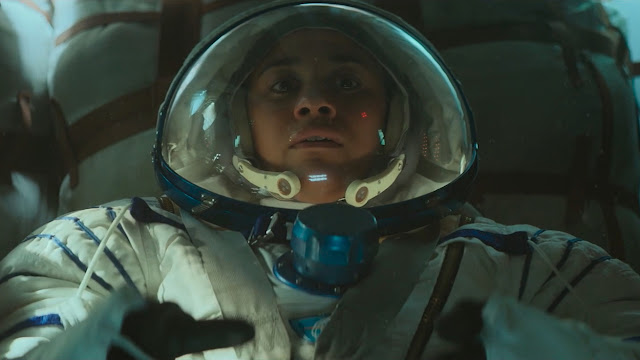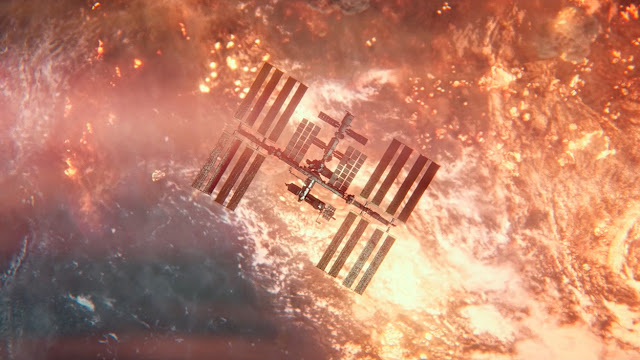The hardest movies to write about are the ones that are fine, the ones that are just kind of okay. Where there’s nothing specifically wrong with them, where there aren’t glaring, slap-you-in-the-face flaws or problems, but also where there’s nothing particularly engaging, memorable, or otherwise noteworthy. And that is the exact place where director Gabriela Cowperthwaite’s extraplanetary thriller I.S.S. lives. It has a strong cast doing solid work, seamless special effects, and a decent amount going for it. But the finished product is little more than a shrug and there’s not much to say beyond, “It’s fine.”
It's the first time on the International Space Station, that floating symbol of international cooperation, for Dr. Kira Foster (Ariana DeBose, West Side Story). She’s excited and raring to get to work on her vaguely scientific sounding research. Along for the ride are her fellow Americans, Gordon Barrett (Chris Messina, Birds of Prey) and Christian Campbell (John Gallagher Jr., Underwater), and a Russian team comprised of Weronika Vetrov (Masha Mashkova, For All Mankind), Nicholai Pulov (Costa Ronin, The Americans), and Alexey Pulov (Pilou Asbaek, Game of Thrones). However harmonious in space, that does not alleviate earthly tensions, and when the U.S. and Russia come to blows in the terrestrial realm, each side is ordered to take control of the I.S.S. by any means necessary. And the station is in danger of falling out of space entirely, which is another problem.
[Related Reading: 'Overlord' Movie Review]
I.S.S. begins well enough. Tensions linger between the crew, the constant pressure of being in close proximity to other people and having no way to get away frays the relationships, communication issues rear up. Cowperthwaite uses the set up and setting to create a general unease. For a movie set in space, with no gravity to speak of, visually, the effects work never falters. Cinematographer Nick Remy Matthews uses handheld cameras to mimic the crew floating in zero gravity, placing the viewer right there amid it all. And when the astronauts peek out the portholes and witness the exchange of nuclear warheads below, the effect is both lovely in an aesthetic sense and harrowing as the reality of what they see sets in.
Nick Shafir’s script does what it can to escalate the tension, both interpersonally between the crew and on a more global scale. It’s reasonably successful in ratcheting up the pressure and increasing the stakes as the civility between sides gradually erodes. The film touches on ideas of duty and allegiance, responsibility, what we owe our countries, what we owe each other, and similar themes, though all in relatively shallow fashion. After the initial set up, which all happens in short order, the plot unfolds in predictable fashion in a relatively plodding pace, especially for a barely-90-minute movie.
[Related Reading: 'Life' Movie Review]
DeBose and Messina both have a level of on-screen charisma, and Asbaek maintains an inherent sketchiness that generates an edge of distrust from the jump, and that comes back around with a twist later. But the characters themselves remain thin and stock, without much to hook, engage, or even interest the audience.
For a film set in what is essentially a single place, the film never takes steps to establish the geography of the station—sometimes it’s cramped and claustrophobic, while in other moments there looks to be plenty of room. This hems in the action and suspense later. As the astronauts hide from one another, attempt to avoid detection, and execute their plans, it’s often unclear just how worried the viewer should be—are the baddies right around the corner or on the other side of the station? And how close is that? Due to the tight circumstances, it doesn’t seem like they should ever be too far away, but for the sake of the set pieces, they may as well be in another country.
[Related Reading: 'Argo' Movie Review]
I.S.S. is well-constructed from a mechanical sense, nicely acted, and engaging enough while you watch. There’s nothing particularly bad about it, but at the same time, there’s nothing particularly great. Like I said, it’s fine. And somehow that’s almost the worst thing a movie can be. Good or bad, great or horrible, at least that leaves an impression and makes you feel some certain way. Regarding I.S.S., there’s not much to feel. [Grade: C+]





No comments:
Post a Comment